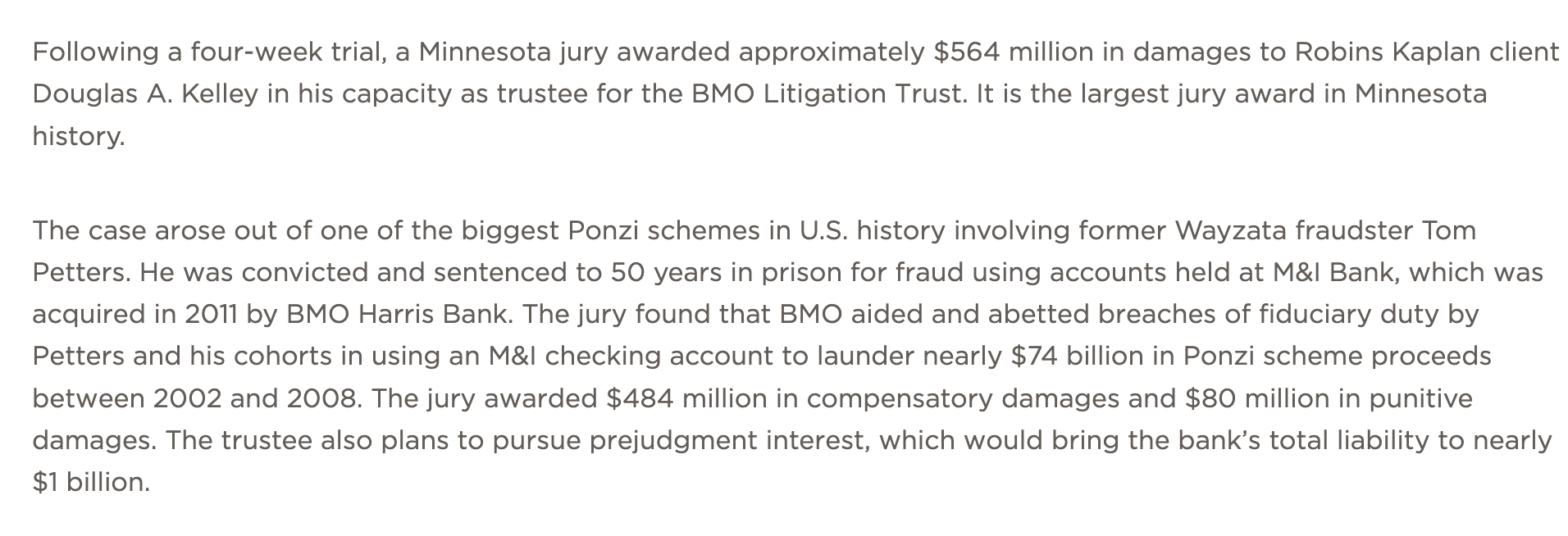LARGEST JURY VERDICT IN MINNESOTA HISTORY
Kelley v. BMO Harris Bank, No. 0:19-cv-01756-WMW (D. Minn)
Fourteen years after FBI agents raided the headquarters of Petters Company Inc. (PCI) and put an end to one of the biggest Ponzi schemes in U.S. history, a federal jury in St. Paul found BMO Harris Bank N.A. liable for aiding and abetting the conspirators’ breach of fiduciary duty. The jury awarded Plaintiff Douglas Kelley, as trustee for the BMO Litigation Trust, $484 million in compensatory damages and assessed an additional $79.5 million in punitive damages against BMO Harris for its role in facilitating the scheme. The total represents the largest ever jury award in a Minnesota civil case and could grow to more than $1 billion when prejudgment interest is assessed.
BMO Harris acquired Milwaukee-based M&I Marshall & Ilsley Bank (M&I) in 2011. From 2002 to 2008, Tom Petters and his co-conspirators moved some $37 billion in and out of a small business banking account at M&I. Despite the massive flow of money through the account and more than three years of monthly anti-money laundering alerts triggering, M&I took no action to shut down the account or to label its activity suspicious.
Kelley’s case against BMO Harris began as an adversary proceeding in bankruptcy court in 2012. Kelley asserted four claims against the bank: violation of the Minnesota Uniform Fiduciaries Act, breach of fiduciary duty, aiding and abetting fraud, and aiding and abetting breach of fiduciary duty. After years of litigation in which Kelley’s claims survived motions to dismiss and for summary judgment and BMO Harris was sanctioned for the destruction of e-mail evidence relating to M&I’s dealings with PCI, Chief Bankruptcy Judge Kathleen Sanberg transferred the matter to the federal district court for the District of Minnesota in summer 2019. There, Judge Wilhelmina Wright denied a BMO Harris appeal of the bankruptcy court’s summary judgment ruling and set the case for trial beginning on October 12, 2022.
Over the course of the trial, jurors heard testimony from more than 20 witnesses, including current and former bank employees and four expert witnesses. Led by partner Michael Collyard, the Robins Kaplan trial team highlighted the disparity between the bank’s anti-money laundering training and policies and the actions of its bankers and analysts, who Kelley alleged turned a blind eye to the fraud over the course of nearly seven years.
Though bank witnesses denied any wrongdoing, Collyard urged jurors in his closing argument to weigh the credibility of their testimony in light of the evidence showing billions of dollars of activity in the PCI account that made no sense for PCI’s purported business model of buying consumer electronics from wholesalers and reselling to big box retailers. After deliberating over the course of three days, the eleven-member jury agreed that the bank’s story didn’t hold up and awarded Kelley the largest single verdict or settlement arising from the Petters scheme.
